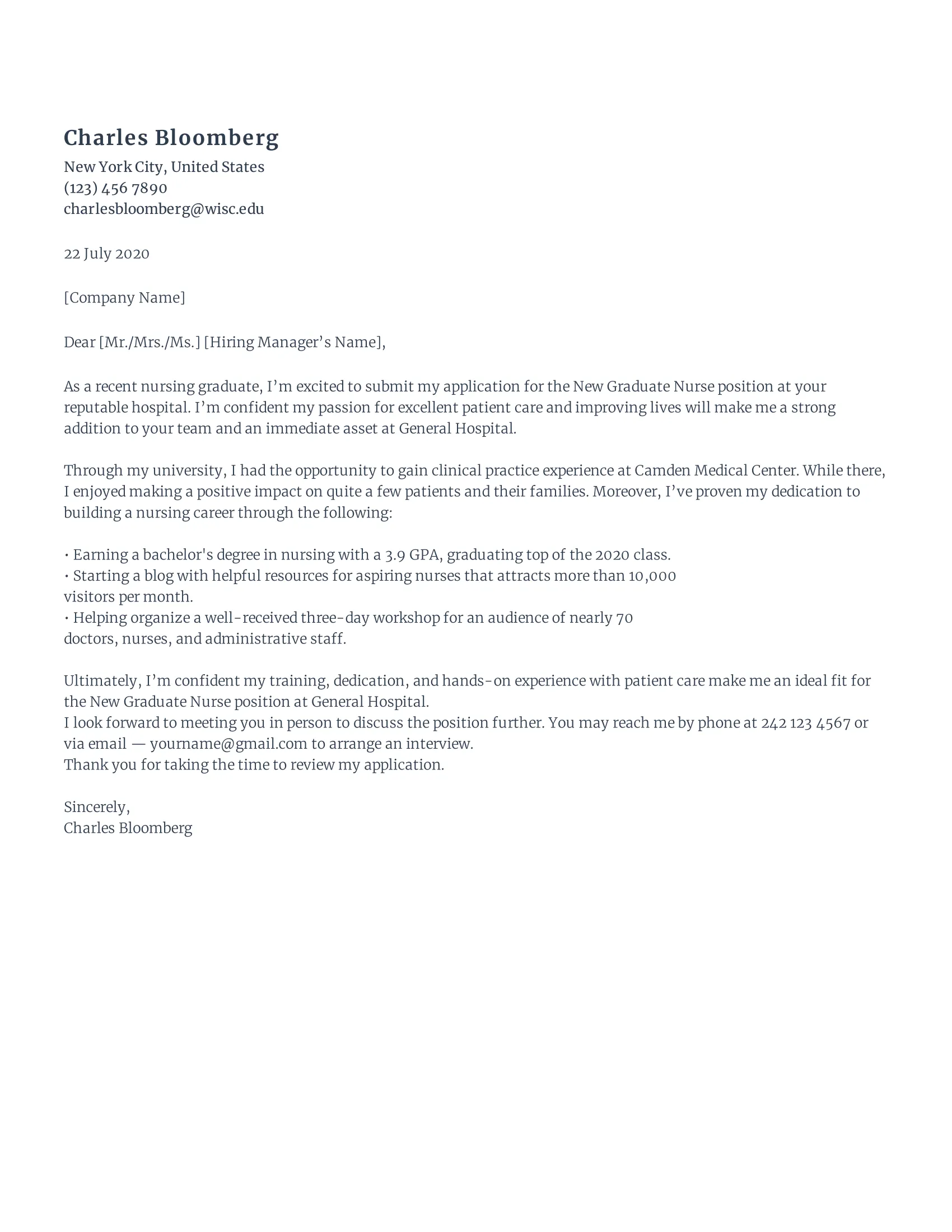Understanding the Nurse Cover Letter
A well-crafted cover letter is a crucial tool for any new nurse seeking employment. It serves as your first introduction to a potential employer, offering an opportunity to showcase your personality, passion, and skills beyond what’s listed on your resume. For new nurses, a strong cover letter is especially important as it allows you to address your limited experience and highlight transferable skills, clinical rotations, and your enthusiasm for the nursing profession. A cover letter acts as a personal marketing document, helping you stand out from the competition and make a positive first impression. Mastering the art of writing an effective cover letter can significantly increase your chances of landing an interview and ultimately securing your dream nursing job.
What is a Nurse Cover Letter?
A nurse cover letter is a formal document submitted alongside your resume when applying for a nursing position. It provides an opportunity to elaborate on your qualifications, experience, and career goals in a personalized manner. Unlike a resume, which is a factual summary of your skills and experience, a cover letter allows you to express your personality, passion for nursing, and explain why you are the perfect fit for the specific role and organization. It should be tailored to each job application, demonstrating your understanding of the employer’s needs and requirements. Essentially, the cover letter bridges the gap between your resume and the hiring manager, giving them a clearer picture of your potential and suitability for the position.
Why is a Cover Letter Important for New Nurses?
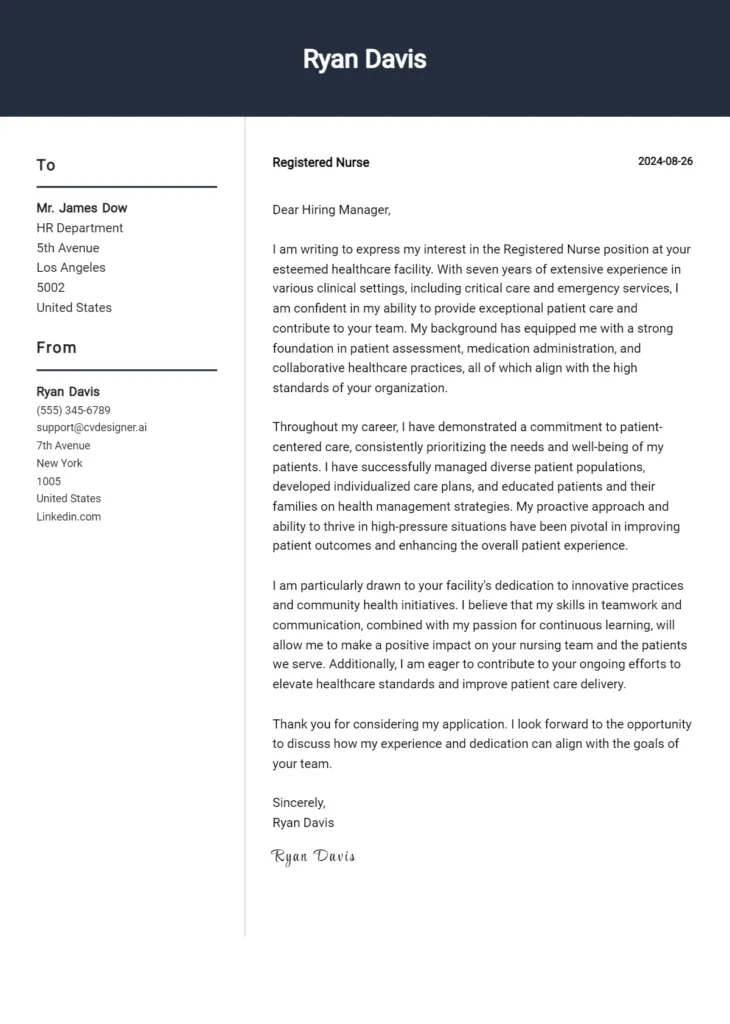
For new nurses, a cover letter is particularly vital because it provides a platform to address the lack of extensive work experience. It allows you to highlight relevant skills gained during clinical rotations, volunteer work, and academic projects. It also gives you the chance to showcase your passion for nursing and your eagerness to learn and grow within a professional environment. A well-written cover letter demonstrates your communication skills, attention to detail, and genuine interest in the specific job and the organization. It can help you stand out from other applicants, making a strong case for why you should be considered despite your limited professional experience. Effectively, a cover letter offers new nurses the opportunity to differentiate themselves and make a memorable first impression.
Key Components of a Winning Nurse Cover Letter
A winning nurse cover letter incorporates several key components that work together to create a compelling and persuasive document. These components include a professional header, a personalized opening, a clear demonstration of skills and experience, a concise and impactful closing, and a polished format. Each element plays a crucial role in making a positive impression on the hiring manager. Adhering to these components ensures that your cover letter is well-organized, easy to read, and effectively conveys your qualifications and enthusiasm for the position. Carefully crafting each section will significantly increase your chances of landing an interview and ultimately securing the nursing job you desire.
Header Essentials for Your Cover Letter
The header of your nurse cover letter should be professional and include all the necessary contact information. This typically consists of your full name, phone number, email address, and optionally, your LinkedIn profile URL. The header should be aligned to the left or centered at the top of the page, using a readable font like Times New Roman or Arial in a standard size. It should also include the date and the recipient’s information, which includes the name of the hiring manager (if known), their title, the name of the hospital or clinic, and the address. A well-formatted header sets a professional tone and makes it easy for the employer to contact you.
Crafting a Compelling Opening
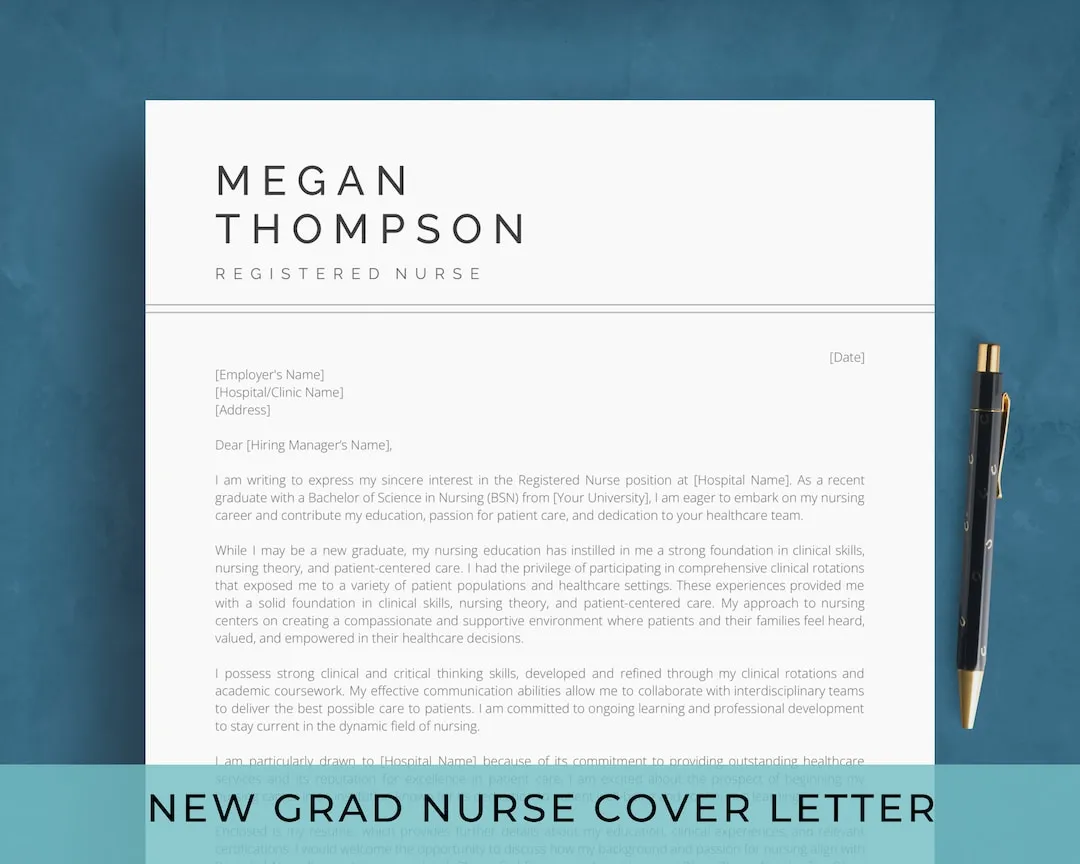
The opening paragraph of your cover letter is your first opportunity to capture the hiring manager’s attention. It should be concise, engaging, and clearly state the position you are applying for. Start by addressing the hiring manager by name, if possible, as this demonstrates that you’ve taken the time to research the company and personalize your application. In the opening, express your enthusiasm for the opportunity and briefly mention where you saw the job posting. Consider stating your key qualifications and why you are interested in the specific organization. A strong opening paragraph sets the tone for the rest of your letter and encourages the reader to continue reading.
Address the Hiring Manager by Name
Addressing the hiring manager by name is a simple yet effective way to personalize your cover letter and demonstrate that you’ve taken the initiative to research the organization. It shows that you’re genuinely interested in the specific role and have made an effort to connect with the company. If you’re unsure of the hiring manager’s name, try to find it on the company’s website, LinkedIn, or by calling the human resources department. Addressing the cover letter to a specific person creates a more personal and engaging tone, making your application stand out from generic applications addressed to “Dear Hiring Manager”.
Highlight Your Passion for Nursing
Expressing your passion for nursing in the opening paragraph immediately grabs the reader’s attention and sets a positive tone. Share why you chose nursing as a career path and what motivates you to provide care. Whether it’s a personal experience, a deep desire to help others, or a fascination with the medical field, communicate your enthusiasm and commitment to the profession. This shows the hiring manager that you are not just looking for a job but are genuinely dedicated to making a difference in patients’ lives. Authenticity is key, so let your passion shine through in your writing.
Showcase Relevant Skills and Experience
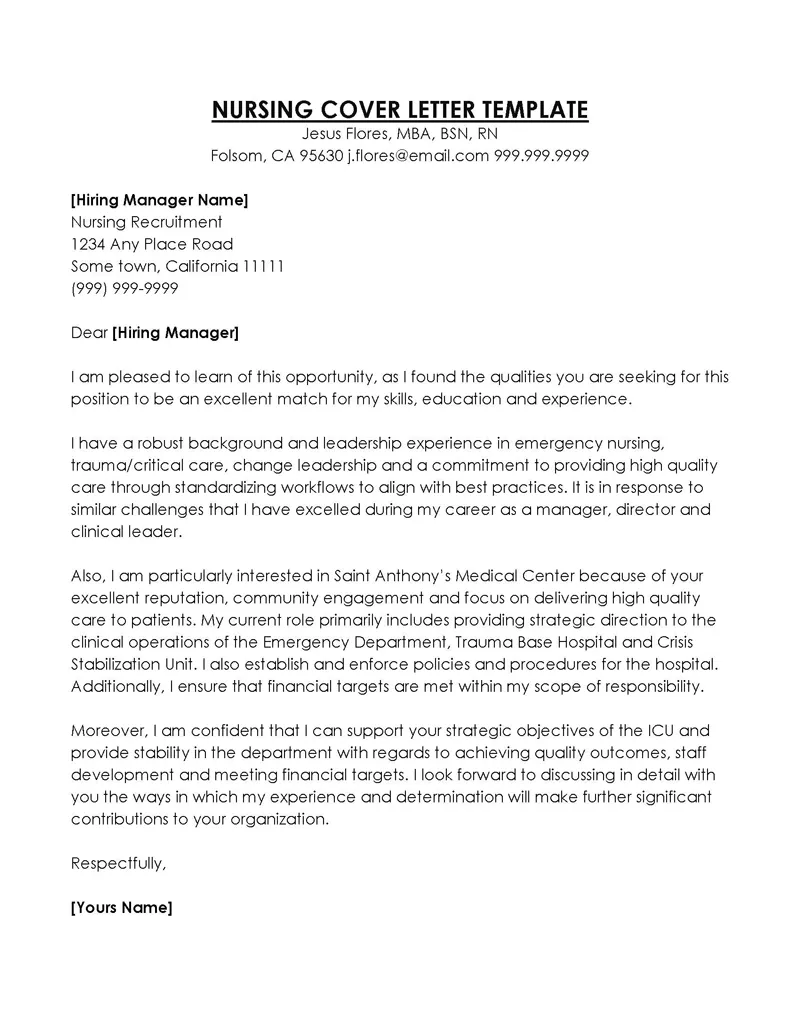
The body of your cover letter should highlight the skills and experiences that make you a qualified candidate for the nursing position. Even if you are a new nurse, you can still showcase relevant skills and experiences gained during clinical rotations, volunteer work, or academic projects. It is crucial to tailor your skills to match the specific job requirements outlined in the job description. Be sure to provide specific examples of how you’ve demonstrated these skills, quantifying your accomplishments whenever possible. Clearly demonstrate how your skills and experiences align with the needs of the employer and the role you are applying for.
Focus on Skills
Highlight both hard and soft skills relevant to nursing. Hard skills include clinical proficiencies like medication administration, patient assessment, and wound care. Soft skills involve communication, teamwork, empathy, and problem-solving. Identify the skills that align with the job description and provide concrete examples of how you’ve utilized these skills in clinical settings or other experiences. Remember to use action verbs and provide concise details to demonstrate your capabilities. Focusing on the skills sought by the employer is critical for showing that you are a good fit for the role.
Emphasize Clinical Skills
If you have previous experience through clinical rotations, be sure to emphasize relevant clinical skills. Mention specific procedures you’ve performed, such as starting IVs, monitoring vital signs, administering medications, or assisting with patient transfers. If you’ve worked in specialized settings, such as the ICU or emergency room, mention those experiences, as well. The more specific you are, the better. Include the number of patients you’ve cared for or any specific skills you’ve developed through simulation exercises or training. This helps the hiring manager understand your practical abilities and familiarity with various clinical scenarios.
Mention Soft Skills
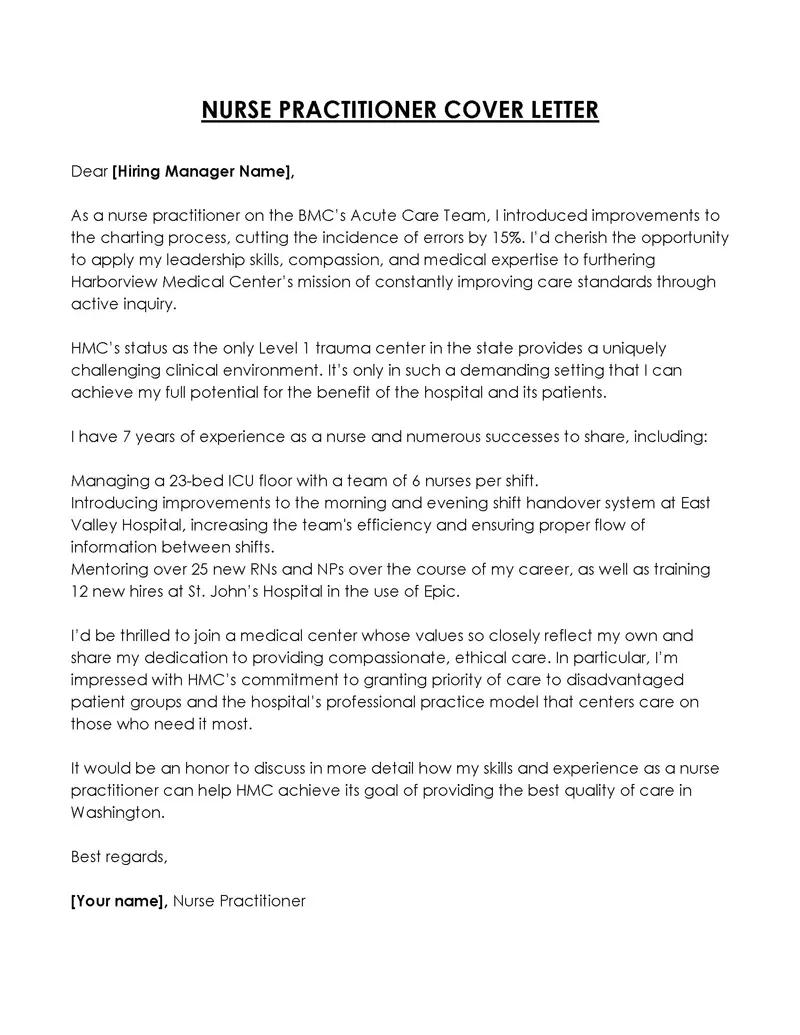
In addition to technical skills, highlight your soft skills, such as communication, empathy, teamwork, and critical thinking. These are essential attributes for a successful nurse. Provide examples of how you have demonstrated these skills in practice. For example, mention how you collaborated with a team of healthcare professionals to improve patient outcomes or how you effectively communicated with patients and their families to provide support and education. These soft skills show you’re not just a competent nurse, but a caring and collaborative healthcare provider.
Address Experience (Even if Limited)
As a new nurse, you may have limited professional experience, but you can still demonstrate your skills and potential. Highlight any clinical rotations, volunteer work, or relevant academic projects you have completed. Describe the tasks you performed, the skills you developed, and any positive outcomes. Frame your experience as a learning opportunity and emphasize your eagerness to grow as a nurse. Show your ability to adapt to new environments, take on challenges, and quickly apply knowledge to real-world scenarios. Demonstrating that you are a quick learner and dedicated to your profession will impress potential employers.
Highlight Clinical Rotations or Volunteer Work
Detail your clinical rotations and volunteer experiences. Mention the specific departments or units you worked in, such as the ICU, emergency room, or surgical ward. Describe the types of patients you cared for and the procedures you assisted with. Quantify your accomplishments whenever possible, such as the number of patients you assisted or the number of procedures you performed. Highlighting your hands-on experience, even during your academic years, demonstrates your practical capabilities and familiarity with various clinical settings.
Emphasize Skills Learned
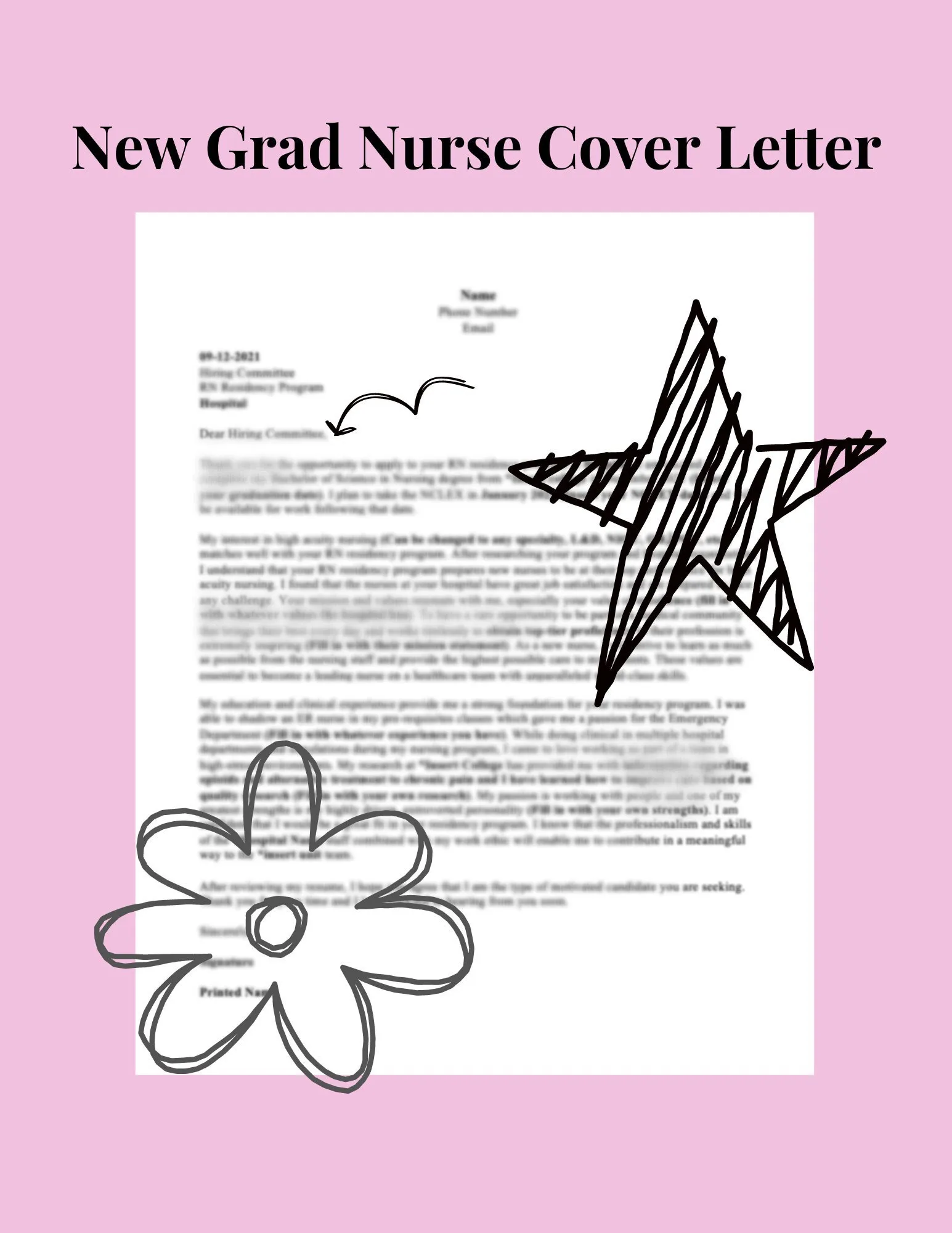
Focus on the skills you’ve learned through your education and practical experiences. This includes technical skills, such as administering medications and monitoring vital signs, and soft skills, such as communication and problem-solving. Use action verbs to describe your accomplishments, for example, “administered medications accurately” or “collaborated with a team of nurses.” Provide specific examples of how you’ve applied your skills to provide patient care and how you’ve contributed to positive outcomes. Emphasizing the skills you’ve acquired during training and practical work helps demonstrate your capabilities and potential in a nursing role.
Demonstrating Your Value Proposition
Demonstrating your value proposition involves clearly articulating what you can bring to the healthcare organization. This means showcasing how your skills, experiences, and personal attributes align with the needs of the employer. Research the organization and identify their values, mission, and goals. Then, tailor your cover letter to demonstrate how you can contribute to those goals. Explain why you are the ideal candidate, how you can benefit the team, and what unique skills you possess. The key is to connect your individual attributes to the organization’s needs, thereby illustrating your value and suitability for the position.
Tailor Your Letter to the Specific Job
Tailoring your cover letter to each specific job is crucial for showing your genuine interest and demonstrating your understanding of the position’s requirements. Carefully review the job description and identify the key skills and qualifications the employer is seeking. Use the job description as a guide to emphasize the relevant skills, experiences, and accomplishments in your cover letter. Address how you meet each requirement, and give specific examples of how you have demonstrated those skills in the past. Customization shows the hiring manager that you’ve taken the time to understand the role and are a perfect fit.
Mention the Company’s Values
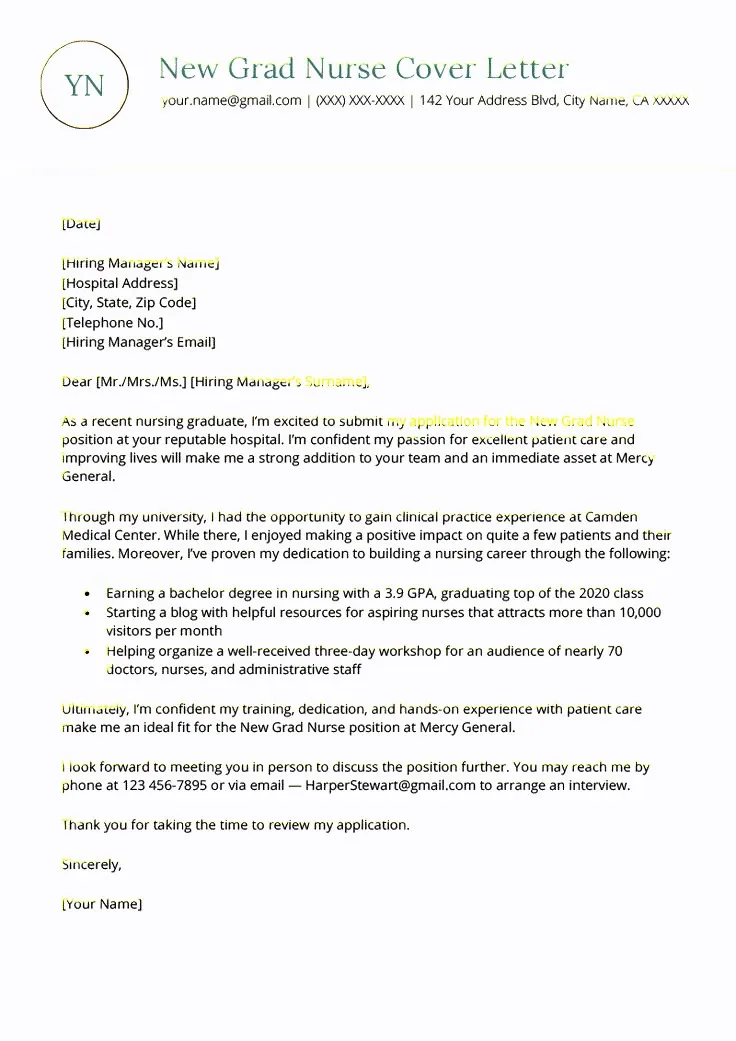
Mentioning the company’s values in your cover letter can help you connect with the organization on a deeper level and demonstrate that you share similar philosophies. Research the company’s mission statement, values, and culture. Then, incorporate these values into your cover letter, showing how your personal values align with the organization’s principles. For instance, if the company prioritizes patient-centered care, you can emphasize your empathy and commitment to providing compassionate support. This shows the hiring manager that you are not just seeking a job but are also committed to the organization’s mission and values.
Show, Don’t Just Tell
Instead of simply stating that you have certain skills or qualities, use specific examples to demonstrate those attributes. Show the hiring manager what you’ve achieved and how you’ve applied your skills in practice. For instance, instead of writing “I am a good communicator,” describe a time when you successfully explained a complex medical procedure to a patient or mediated a conflict between a patient and a family member. Providing tangible examples makes your claims more credible and helps the hiring manager visualize your capabilities. Showing your abilities through specific examples is more persuasive than simply telling them.
Creating a Powerful Closing
The closing paragraph of your cover letter is your final opportunity to leave a lasting impression. Express your enthusiasm for the opportunity and summarize your key qualifications. Reiterate your interest in the position, and let the hiring manager know how eager you are to contribute to the organization. End with a clear call to action, such as requesting an interview. A strong closing paragraph is important to summarize your qualifications and inspire the hiring manager to take the next step in the hiring process.
Express Enthusiasm for the Opportunity
Expressing your enthusiasm for the opportunity is critical in the closing paragraph. Reiterate your interest in the nursing position and your eagerness to contribute to the organization. Show that you are genuinely excited about the prospect of working at the hospital or clinic. This demonstrates your commitment and motivation, making you a more appealing candidate. Use positive and enthusiastic language to convey your passion for the role and your desire to make a difference in the lives of patients.
Call to Action Request an Interview
Include a clear call to action to encourage the hiring manager to take the next step. Request an interview and provide your contact information again. Make it easy for the hiring manager to reach you by stating your availability for an interview or mentioning when you are available to begin the role. Ensure the hiring manager knows you’re ready to discuss your qualifications further. This helps facilitate the application process and moves you closer to landing your dream job.
Formatting and Proofreading Your Letter
Proper formatting and careful proofreading are crucial to presenting a polished and professional cover letter. The overall presentation reflects your attention to detail and professionalism. It shows that you value the opportunity and are committed to providing a high-quality application. Neglecting these details could detract from your qualifications. A well-formatted and error-free cover letter demonstrates your professionalism and enhances your chances of making a positive impression.
Choose a Professional Font and Layout
Select a professional and readable font, like Times New Roman, Arial, or Calibri, with a size between 11 and 12 points. Use a standard layout with one-inch margins on all sides. Ensure your cover letter is single-spaced, with a double space between paragraphs for clarity. Organize your content logically with clear headings and bullet points where appropriate, to break up large blocks of text. A well-formatted cover letter is easy to read and visually appealing, which helps the hiring manager focus on your qualifications.
Proofread Carefully for Errors
Proofreading your cover letter is essential to catch any typos, grammatical errors, or inconsistencies. Read your letter multiple times and consider using tools like Grammarly to assist. Ask a trusted friend or colleague to review your letter for a fresh perspective. A mistake-free cover letter demonstrates your attention to detail and professionalism, while errors can create a negative impression. Take the time to proofread carefully to ensure your cover letter presents you in the best possible light.
Common Mistakes to Avoid
Avoid common mistakes that can undermine your cover letter and reduce your chances of getting an interview. These mistakes often include using generic language, making typos or grammatical errors, and failing to tailor the letter to the specific job. Being mindful of these pitfalls will ensure that your cover letter is effective and professional.
Generic Language
Avoid using generic language or clichés that don’t convey your personality or unique skills. Generic phrases and statements fail to distinguish you from other applicants. Instead, use specific and compelling language to describe your skills, experiences, and career aspirations. Tailor your cover letter to reflect your understanding of the job requirements and the company’s values. Use details and concrete examples to showcase what you bring to the table and make your cover letter stand out.
Typos and Grammatical Errors
Carelessly made typos and grammatical errors can significantly diminish the impact of your cover letter and suggest a lack of attention to detail. Always proofread your cover letter multiple times. Ask a friend or family member to review it, too. Errors can create a negative impression and make you appear unprofessional. Ensure that your cover letter is free of mistakes before submitting it.
Failing to Tailor the Letter
One of the most common mistakes is failing to tailor your cover letter to the specific job. Sending a generic cover letter that’s not customized to the role shows a lack of interest. Always review the job description and tailor your letter to highlight the skills and experiences most relevant to the position. Addressing the employer by name, showcasing that you understand the company’s mission, and demonstrating why you are the ideal candidate are all very important. Customizing your cover letter shows your genuine interest in the role.
Additional Tips for New Nurses
In addition to the essential components and best practices for a nurse cover letter, there are a few extra tips to enhance your application and boost your chances of getting hired. These tips include researching the hospital or clinic and showcasing your certifications and licenses.
Research the Hospital or Clinic
Before writing your cover letter, research the hospital or clinic to understand its mission, values, and culture. This information will help you tailor your letter and show that you are genuinely interested in working for that organization. Visit their website, read online reviews, and if possible, speak with current employees to gain insights into the work environment. Knowing the organization’s values will help you align your skills and experiences with their needs and goals, making your cover letter more compelling and relevant.
Showcase Your Certifications and Licenses
Ensure that you clearly state your nursing licenses and certifications in your cover letter. Mention your RN (Registered Nurse) license and any additional certifications. If you have certifications in specialized areas, such as BLS, ACLS, or others, highlight them prominently, since they can increase your value as a candidate. Providing this information will help potential employers quickly assess your qualifications and make you a more attractive candidate.
In conclusion, creating a compelling cover letter is a crucial step for new nurses aiming to secure their first job. By understanding the key components of a strong cover letter, addressing your lack of experience, showcasing your skills, and tailoring your application to each job, you can significantly increase your chances of landing an interview and launching your nursing career. Remember to express your enthusiasm, demonstrate your value, and always proofread carefully. Good luck with your job search!
